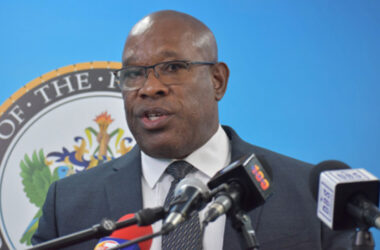Saint Lucia is in the process of revising its National Risk Assessment ahead of an application for re-rating, in November.
The National Anti-Money Laundering Oversight Committee (NAMLOC) has sought to strengthen the country’s capacity to combat money laundering, terrorist, and proliferation financing.
One of the mandates of NAMLOC is to review Saint Lucia’s legislative framework in relation to money laundering and propose the necessary amendments to existing legislation and enactment of new legislation to close existing gaps.
Money Laundering is viewed as a serious and growing issue globally. The United Nations Office on Drugs and Crime estimates that between 2% and 5 % of global GDP is laundered; and this amounts to $800 million to $2 trillion annually.

Juliana Alfred, Permanent Secretary in the Attorney General’s Chambers and Chair of the National Anti-Money Laundering Oversight Committee (NAMLOC) explained that NAMLOC, which is an inter-sectoral committee set up by the Cabinet of Ministers, is actively working to monitor and mitigate the risks posed to the various sectors within Saint Lucia by money laundering, terrorist and proliferation financing.
“So, all of this work that the committee is doing is with the intension that towards the end of this year Saint Lucia will be applying for re-rating to remove us from enhanced follow-up because currently, we are under enhanced follow-up because of all of these deficiencies, ” said Alfred.

Kozel Creese is the Senior Crown Counsel in the AG’s Chambers and Deputy Chair of NAMLOC. She said Saint Lucia has been sighted as falling short on some of the forty standards set by the Financial Action Task Force (FATF) which is the inter-governmental policymaking body established to set international standards to combat money laundering, terrorist, and proliferation financing.
“St. Lucia would have been graded on each of these rules. So, from our standpoint, we were partially compliant in at least twenty-two and non-compliant in eight,” Creese declared.
“Some of the things I would identify in terms of our risks; one of the suggestions of the Mutual Evaluation Report is that Saint Lucia must be able to sufficiently identify its Money Laundering and Terrorist Financing risk and must be able to allocate resources in terms of which are the higher risker areas, and which are the low-risk areas,” Creese said.
She added that Saint Lucia’s Anti-Money Laundering legislation must also ensure that there is sufficient, dissuasive, and proportionate sanctioning for persons who breach the Money Laundering Prevention Act.
“Specifically in relation to Non-Profit Organisations (NPOs), they considered that these organisations are off course higher risk however, St. Lucia has not addressed in terms of which subset of these NPOs would be a higher risk for money laundering or terrorist financing,” said Creese.
Though compliance to the international standards is “voluntary” the economic ramifications for deliberate non-compliance can be catastrophic, with countries facing being grey or blacklisted or even losing correspondent banking privileges.
Added Creese: “What you will see happening is obviously a disruption in services, you would see higher costs of services as a result of that. When we look at the issue of remittances, which are a very big thing for the region that can be affected as well. So these recommendations as small island developing states we essentially have no choice but to comply because the ramifications are quite intense.”
NAMLOC has commenced the ramping up of its stakeholder engagement and public sensitization programme in relation to the necessary amendments to various pieces of legislation that support the Anti-Money Laundering Prevention Act. A panel discussion held at the NTN Studios formed part of this public sensitization effort where issues such as customer due diligence, risk mitigation, compliance requirements, and sources of funds were addressed by industry professionals.
Saint Lucia will apply for a re-rating of its National Risk Assessment in November 2023.














